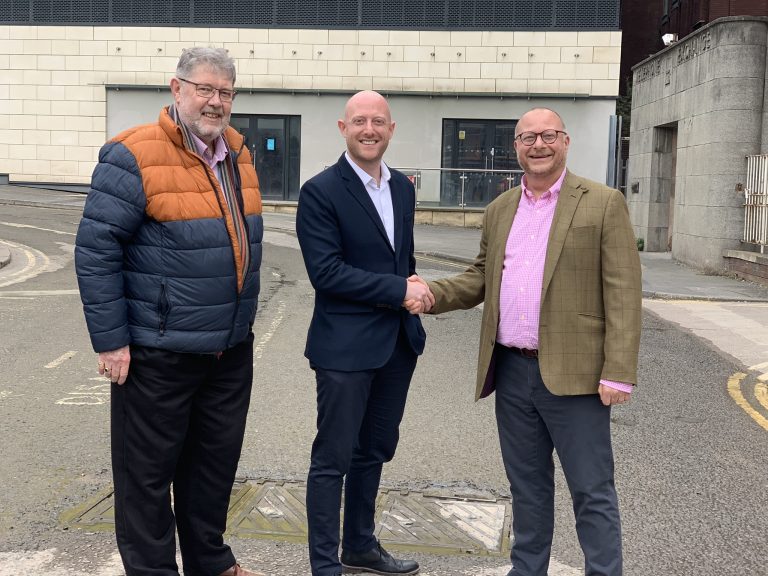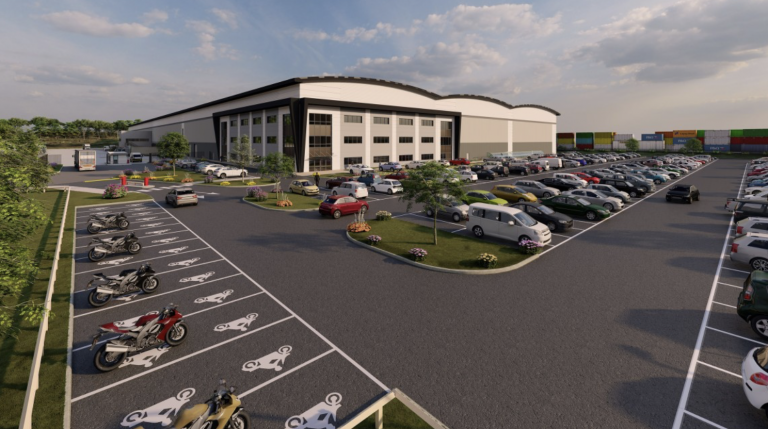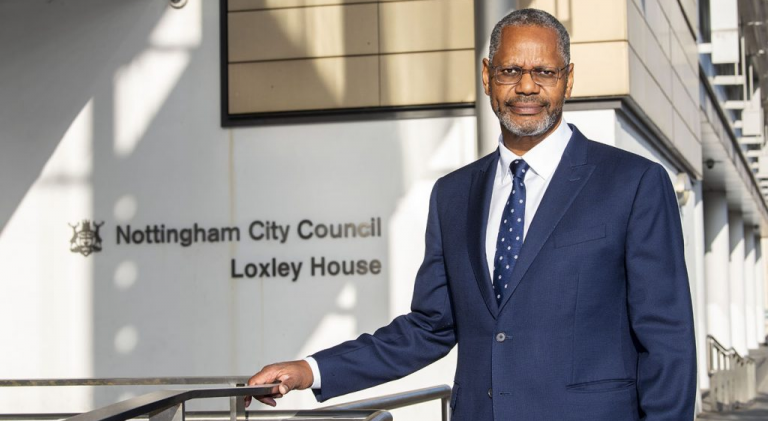Saturday, April 5, 2025
Derby’s new £45.8m performance venue has reached a new milestone, with contracts signed this week between Derby City Council, Leeds-based developers St James Securities and venue management and services company, ASM Global.
Planning permission, land acquisitions and other pre-commencement conditions have now been fully satisfied and ASM Global has entered into an unconditional Agreement for Lease with Derby City Council and St James Securities, which will give the green light for construction work to commence.
ASM Global, which has a global network of more than 350 venues around the world, will work with St James Securities and Derby City Council on the design development of the venue, located in Derby city centre.
The new 3,500 capacity entertainment and events venue forms phase two of the £200m Becketwell regeneration scheme, which is the most significant urban regeneration scheme in the city for more than 30 years.
Construction work is underway on phase one of the scheme, 259 Build to Rent apartments on the site of the former Debenhams store on Victoria Street, which will be funded, acquired, and operated by Grainger plc, market leaders in the UK build to rent and private rented sector.
The new performance venue will be built on the site of the former Pennine Hotel, Laurie House offices, multi-storey car park and Pink Coconut nightclub in Colyear Street and Padley House in Becket Street.
The new venue will be owned by Derby City Council and leased to and operated by ASM Global.
The venue is expected to significantly add to the cultural offering in the city. It will offer a larger, more flexible space than the city centre has had in the past and will collaborate with and complement the activities of Derby Arena to provide the best possible events programme for Derby and the wider region.
It will be a scalable space capable of staging a range of concerts, stand-up comedy, family shows, musical theatre, exhibitions, and business events.
The venue is a key component of Derby’s recovery plan which is putting culture at the heart of the city centre and is playing a major role in Derby’s bid for City of Culture 2025.
The performance venue, which will be at the heart of the wider mixed-use Becketwell development scheme, will help regenerate the area and is expected to bring benefits to the city including attracting both visitors and residents to the city centre.
The planning application for the venue received the written support of key stakeholders and business leaders including D2N2 LEP, East Midlands Chamber, the University of Derby, Derbion, Marketing Derby, Derby Live, Déda, QUAD, Derby College, Pauline Lathan MP, Amanda Solloway MP, Margaret Becket MP, the Cathedral Quarter and St Peter’s Quarter BIDS.
The venue is set to host over 200 cultural and commercial events each year and attract an additional 250,000 visitors to Derby. It is also expected to create over 200 new local jobs, generate more than £10m GVA per year for the area, diversify the economy and increase levels of investment in surrounding areas of the city centre.
Demolition work has recently commenced, with construction work on the performance venue set to commence in January 2023, with completion and handover to ASM Global in late 2024.
Cllr Chris Poulter, leader of Derby City Council, said: “This is an exciting milestone in delivering The Becketwell Performance Venue. This new and flexible space is a key part of putting culture back into the heart of Derby.
“We are delighted to be moving on the next steps of this journey working together with long term partners ASM Global and St James Securities.
“This ambitious venue run by a world-leading operator will create hundreds of jobs, attract investment and generate millions of pounds each year for the city along with attracting new visitors and residents to Derby City Centre.”
Tom Lynch, group commercial director & senior vice president, Europe of ASM Global, said: “We’re delighted to have closed this exciting deal with Derby City Council and St James Securities to bring to market such an ambitious state of the art venue.
“ASM Global looks forward to building on the great success of our UK venue portfolio and leveraging our strength in venue programming and commercialisation, to further develop the cultural landscape in the Midlands and support the ongoing growth of the region’s economy.”
Chris Bray, executive vice president, Europe of ASM Global, said: “This deal marks the start of an ambitious and transformational development, and ASM Global is incredibly pleased to be a part of the journey. We’re excited to join forces with Derby City Council and St James Securities for this significant regeneration, and new cultural hub in the centre of Derby.”
Paul Morris, director of St James Securities, said: “We are pleased to have concluded our agreement with Derby City Council and ASM Global, who have a global reputation for excellence.
“We look forward to moving this exciting project to the construction phase and deliver this scheme to the people of Derby and the wider region.
“Closing the performance venue deal and starting on site this month continues the success story at Becketwell with over £85m of development now underway. We will continue to build on these successes as we look to bring forward further mixed-use phases in the coming months.”
Future planned phases of the scheme include the potential for a range of other complementary uses of the site including new grade A offices and commercial space, a hotel and a multi-storey car park and purpose-built student residential.
The East Midlands’ unemployment rate has hit a fresh new low at 3.1% for the period between November 2021 and January 2022, new figures show.
It falls from 3.4% for the previous three-month reporting period and compares to a UK average of 3.9%.
For the third month running, this is the lowest level since the Office for National Statistics (ONS) began publishing regional labour market figures in April 2015, and is now higher than only three other regions – the South West of England, Wales and Northern Ireland.
East Midlands Chamber Chief Executive Scott Knowles said: “It’s fantastic news for the region’s labour market that the unemployment rate has plummeted in recent months, hitting a fresh new low for the beginning of this year.
“Amid so much uncertainty in the world at the moment, it sends a clear signal that the East Midlands is open for business and recovering strongly from the direct impacts of the pandemic.
“The improving picture reflects our own research, which indicates our region’s firms are creating jobs to meet strong demand following the removal of restrictions.
“The Chamber’s latest Quarterly Economic Survey (QES) for Q1 2022 showed a net 20% of businesses increased their workforce in the previous three months, while a net 36% expected it to increase over the coming quarter.
“We are represented by a very diverse economy in the East Midlands – ranging from logistics and services to hospitality and tourism – while our manufacturing industry continues to play a hugely important role, with our region having the highest proportion of production sector jobs at 12.2%.”
While unemployment fell below pre-pandemic levels for the first time at a national level, the ONS said the number of people out of work and not looking for a job rose again, meaning total employment remained well below its pre-Covid level.
In the East Midlands, the economic inactivity rate – which measures the proportion of 16 to 64-year-olds who have exited the labour market for reasons such as retirement, caring duties or studying – was above the 21.3% national average at 21.6%.
Scott added: “With more people leaving the labour market and fewer overseas workers to choose from since the end of the UK-EU transition period just over a year ago, we are beginning to see emerging skills gaps across numerous industries.
“With the cost of business continuing to rise amid surging inflation and price rises in aspects such as energy, supplies and people, the impact this will have on business growth – which ultimately fuels local job creation and wealth – remains a considerable worry.
“Two-thirds of East Midlands businesses told us they have seen price rises and cashflow is now down for the first time in over a year. All this highlights the importance of investing heavily in skills, something that was highlighted in the Government’s Levelling Up White Paper as one of its 12 ‘missions’ but must now be prioritised with rapid action to ensure our post-Covid and post-Brexit economic recovery doesn’t stall.
“With the Spring Statement also coming up next week, this is a timely reminder that the Chancellor must not impose any new costs or taxes on businesses, and should also delay the introduction of the planned National Insurance rise.”
Four businesses have been awarded funding for Knowledge Transfer Partnerships (KTPs) that will allow them to benefit from a new range of expertise and will encourage their business to grow.
Part-funded by Innovate UK, KTPs bridge the gap between industry and academic knowledge, which will in turn allow businesses to grow with the help of University of Lincoln, and its academic experts.
Warden Agri, Sanctuary, METIS Aerospace and Streets Heaver, will work closely with specialist academics from University of Lincoln, known as Associates, to help innovate and grow their businesses.
Three of the businesses are based in the Lincoln area, except for Sanctuary, which is a Worcester-based company that delivers sustainable housing solutions.
Their project will focus on the need to innovate home design and construction methods to respond to global challenges of climate change, while creating affordable, sustainable homes.
Stephen Pretlove, head of Lincoln School of Architecture, said: “We are delighted to be collaborating with the Sanctuary Group on this timely project, which brings together academic expertise from Lincoln, in housing design and construction, sustainability, waste, and low carbon strategies, with one of the UK’s largest and leading providers of social and private housing.
“The project provides a unique opportunity for academic and industrial cooperation, which will benefit both the housing sector, and our academic understanding of the challenging issues that we all face as we move towards a zero-carbon built environment.”
Colleen Eccles, Sanctuary’s head of Place Shaping, said: “There are increasing pressures on the construction industry to create new homes that are both sustainable and affordable, and this innovative project will allow us to identify new approaches to development work that will shape future building.”
One of the local businesses benefiting from Knowledge Transfer Partnerships is Warden Agri, who are aiming to develop safe and sustainable food waste products, and to extend the current business ecosystem to include processing, manufacturing and validation of these opportunities.
Johanna Buitelaar-Warden, director of Warden-Agri, said: “The project will allow us to embed a process for developing novel food ingredients from waste and by products in the food and feed supply chain, evolving our business to the next level.
“The Knowledge Transfer Partnership has set out a really helpful framework and we have already recruited an outstanding graduate who is coming to us from Nestle SA.
“She has a balance of both academic and business skills; very much mirroring the essence of the KTP.”
PKF Smith Cooper is delighted to welcome Corporate Finance Senior Executive Harnil Motivaras to the team. Harnil joins from PwC where he worked alongside large corporate clients, as well as SME’s and owner-managed businesses, operating across a range of industries.
The specialist corporate finance division of PKF Smith Cooper, of which Harnil will be a key member, offers both practical and strategic advice across a variety of areas, whether clients are looking to buy, sell or grow a business.
The team specialises in high-intensity project management of deals, from company acquisitions and disposals, through to fundraising and succession planning.
The corporate finance team are also experts in a variety of sectors, from food and drink and self storage, to fire & security and automotive, making PKF Smith Cooper the adviser of choice in national and international transactions in these sectors.
James Ward, Corporate Finance Director based in the Nottingham office comments: “I am delighted to welcome Harnil to the team. He will have an integral role in the development of PKF Smith Cooper’s corporate finance team primarily in Nottingham, but also across the wider firm working alongside colleagues in our Derby and Birmingham offices.
Our corporate finance team continues to develop, and I look forward to working alongside Harnil in creating innovative solutions and value for the clients we work with.
We are continuing to recruit and are always looking for people of all experience levels to join our award-winning team”.
Lincolnshire Co-op’s CEO Ursula Lidbetter has announced her plan to retire at the end of 2022, after a career with the Society spanning 37 years.
Ursula, who started in 1985 as a buyer and department manager, is in her 18th year as CEO of Lincolnshire Co-op, which has over 220 varied outlets and recorded sales of over £355m in 2020/21.
She’s also been at the helm of major projects including the creation of the Lincoln Science and Innovation Park and The Cornhill Quarter development in Lincoln. She received her OBE in 2019 for services to the local economy.
This year will see Ursula turn 60 and, after almost two thirds of her life working for Lincolnshire Co-op, she feels it’s the right time to retire and spend more time with family.
She said: “It’s a privilege to work alongside my 2,900 colleagues to lead this special business, where we aim to make life better in our communities every day.
“It’s also wonderful to collaborate with many like-minded people in organisations across Lincolnshire and beyond to bring forward schemes making such a difference.
“In due course, I will hand over to my successor who will take us into the next stage of our development.”
Lincolnshire Co-op’s Board of Directors will be conducting a recruitment process for the new CEO over coming months.
Chair David Cowell said: “The Board would like to thank Ursula for the huge contribution she has made to the success of the society during her time here. She will be leaving our co-op in great shape to move on to its next chapter, based upon the strong legacy that has been built over 161 years of trading.
“In the meantime, we have a busy programme of work for 2022 and look forward to delivering this under Ursula’s expert leadership.”
SMB College Group have recently embarked on an exciting new venture with the Defence Animal Training Regiment (DATR), forging a partnership that will serve to provide a wealth of industry-relevant knowledge and experience for students.
Students from the college’s Horticulture, Countryside Management, Uniformed Public Services, Animal Management and Equine departments will benefit from work placements, industry insight and enrichment with the DATR, which is located in Melton Mowbray – just 7 miles away from the college’s 850-acre Brooksby estate.
This new working agreement will also facilitate the sharing of industry knowledge, allowing both organisations to champion welfare, care and industry best practice.
When speaking of this exciting new partnership and the opportunities it will bring, the Commanding Officer of the Defence Animal Training Regiment, Lieutenant Colonel Mike Robinson, said ‘This Memorandum of Understanding recognises the significant benefits of our cooperative and reciprocal relationship, notably exploiting the land-based, animal care and public service parallels that exist between our two organisations.
‘We have identified opportunities that will strengthen both our organisations and allow for increased knowledge exchange, work placement opportunities and improvements to animal practice. The benefits are already being realised with partnering between the College, Defence Animal Training Regiment and The Dog Trust’s Animal Welfare Scheme as a triumvirate championing welfare, care and industry best-practice.
‘Furthermore, the College also provides an OFSTED-recommended Independent Advisory Panel to support the assurance of the duty of care to our trainees. The pastoral expertise of the College provides us with an independent, objective perspective, which is an invaluable source of advice, challenge and encouragement. It also supports our young soldiers under training and strengthens the Regiment’s continuous improvement programme.’
James Thorne, Assistant Principal at SMB College Group, added ‘SMB College Group – Brooksby Campus is delighted to be working with Defence Animal Training Regiment (DATR – MOD). This partnership will bring so many new opportunities to both our Further Education learners and our Undergraduate students, including a valuable insight into a very professional and high performing working environment.
‘Students will be working on a range of projects including involvement in the Equine and Dog units, competitions, and welfare schemes, in addition to conservation and environment input for the campus base. Uniformed Public Services students will also have the opportunity to experience personal training sessions. We look forward to working with DATR through this long term collaborative partnership’.
One such opportunity, that is already underway, is an Animal Management degree project in which students are engaging with the DATR and Dogs Trust Animal Welfare Scheme. When asked about this project, Animal Management Lecturer, Beth Prior, said ‘This scheme has allowed our students to put their knowledge into practice, completing a range of animal welfare assessments during regular visits to DATR, and sharing knowledge of animal welfare, care and industry best practice between the three organisations.’
SMB College Group is a Further Education college based across three campuses in Leicestershire. The college’s Brooksby Campus is an 850-acre countryside estate that specialises in training students in the land-based industries, sport and uniformed public services, with opportunities ranging from Entry Level courses up to Undergraduate degree programmes.
The Defence Animal Training Regiment is a training establishment based in Melton Mowbray, which trains animals for all three armed forces. Its headquarters are also the principal base of the Royal Army Veterinary Corps.
A pair of volunteers from Northampton who run an eco-sustainable farm with an education and rejuvenation centre have received Prime Minister Boris Johnson’s daily Points of Light award.
They have now been described as outstanding individuals by those working in Parliament.
‘Sol Haven’, run by Sammuel Yisrael and Natasha Caton in Moulton, hosts wellbeing projects, particularly for people who have experienced hardship and has delivered wellbeing events to over 500 people, including many vulnerable and homeless individuals.
Natasha experienced various addictions and homelessness at a young age, and partnered with Sammuel, a long-time community volunteer who has extensive experience of working with people who are disabled, have learning disabilities or are living homeless.
Together they created a project that could help people grow and recover from adversity by connecting meaningfully with natural surroundings. On their farm, the pair provide sessions in rural skills, growing food, eco-therapy, meditation, nature-based arts and crafts, and cooking, led by Natasha, who is a Michelin-trained vegan chef.
Congratulating Sammuel and Natasha on their award, Chris Heaton-Harris, MP for Daventry, said: “It is wonderful news that Sammuel and Natasha are being recognised by the Prime Minister for their outstanding contribution and support to homeless and vulnerable people in the community. ‘Sol Haven’ really is changing people’s lives through education and rejuvenation, and I hope their actions will inspire others to provide a helping hand to those in need. A very big well done indeed.”
Sammuel and Natasha said: “This is an incredibly humbling experience to be honoured in this way. Points of Light is an important initiative and we are honoured to be considered as ‘outstanding individuals’ by those working in Parliament.
“We are beyond delighted to be able to offer vulnerable and homeless individuals a safe working environment to learn, grow, and reach their full potential. Bringing all our passions and expertise together to offer an opportunity we truly believe, and hope will help many people.”
Sammuel and Natasha are recipients of the Prime Minister’s UK daily Points of Light award, which was first launched in April 2014 to recognise outstanding individuals making a difference where they live.
This award comes at the time of them launching their new wellbeing course ‘Ploughing The Mind’ which has been supported by the National Lottery Community Fund.
The ‘Ploughing The Mind’ 12-week course has been carefully designed to help people struggling with their mental health to reconnect with the community, themselves and make new friends.
Activities within the course include nature and horticultural therapy, mental health education, movement meditation, drumming and cooking; a mixture of activities combined to provide support, outlets for expression and the ability to learn new skills.
Following the completion of the programme Sol Haven will look to continue to support people in a wider programme. One that will continue to help them to overcome the barriers to both engaging socially with others and finding work.
Clowes Developments (UK) Limited have now submitted a Planning Application for EMDC 342.
This is a huge landmark for both Clowes and FHP as the development of EMDC 342, a new 342,000ft² distribution centre which will be delivered for the summer of 2023, will complete the 200 acre redevelopment of the former Castle Donington Power Station at East Midlands Distribution Centre, J24, Castle Donington.
EMDC is a nationally recognised Distribution Park dominated by the one million square foot e-commerce Distribution Centre of Marks and Spencer.
The site is also the home to Moran Logistics who relocated their UK HQ to EMDC and to Birlea Furniture who are one of the fastest growing online furniture providers within the UK.
Plot 1 has recently been completed providing a further 521,000 sq ft (48,402 sq m), Big distribution unit on site.
Interest is invited in the remainder of the site where units are available in the size range 30,000ft² (2,787m²) to 342,744ft² (31,842m²).
The site is a hive of activity with EMDC 190 (190,000ft²) and EMDC 280 (280,000ft²) both under construction and due for completion in July / August.
Contact John Proctor or Tim Gilbertson at FHP for further information.
Nottingham City Council, in collaboration with Nottingham Business Improvement District (BID), the organisation behind It’s in Nottingham; is proud to present the first Ay-UpMarket.
The three-day event will run in Old Market Square from Friday 25 March to Sunday 27 March and as part of a partnership with the Creative Quarter, the market will also be held in Sneinton Market Avenues on Saturday 26 March.
The Ay-UpMarket gives Nottingham’s independent retail businesses, both bricks and mortar and online the opportunity to trade at a unique event to highlight the city’s fantastic independent retail sector.
This event has been made possible with funding available nationally from the European Regional Development Fund (ERDF). The Welcome Back Fund has provided councils across England a share of £56 million to support the safe return to high streets and help build back better from the pandemic.
Alongside the market stalls, the event will also include a full programme of live music and other street entertainers to attract visitors of all ages.
While the event is a celebration of today’s Nottingham’s independent traders, it also recognises the heritage of Nottingham’s markets. Historically, the Old Market Square forms a meeting place for the people of Nottingham, where the first “official” mention of a Nottingham market is during the reign of Henry II (1154–1189). It seems pretty much anything and everything could be traded at the Great Market Place.
Down at Sneinton Market Avenues, the whole area was changed by the arrival of the Wholesale Market moved from the Old Market Square in 1900 to accommodate the new electric trams. All the traders moved – wholesale fruit, flower and vegetable dealers and fish, game and poultry merchants.
The entertainment programme also nods to our history of market trading, where on Friday you can make your way through a honey-perfumed bee colony, grab some gardening advice from The Strolling Gardeners, or meet the Vegetable Nannies on a day trip with their family of little ones. So, if you see an old pram brimming with some beautiful bouncing baby fruits and vegetables, come over and say hello!
On Saturday the theme turns fishy, with a chance to explore a whale’s belly, meet a mermaid as well as encountering a giant lobster, octopuses, dancing prawns, and deep-sea divers.
On Sunday the city’s makers and creators are celebrated through poetry, live music and giant colouring wall.
Cllr Sam Webster Portfolio Holder for Finance and Resources said – “We are very pleased to be able to use this grant funding to encourage more people back into our city centre in this way. It’s an opportunity to support and showcase our local independent businesses which particularly felt the strains of the last two years. I’ll certainly be visiting and I look forward to meeting some of the traders at the event.”
Commenting on the event, Alex Flint, CEO of Nottingham Business Improvement District (BID)said: “We are delighted to be part of the first ever Ay-UpMarket – this is a great opportunity to shine the spotlight on all the amazing independent businesses that we have here in the city, as well as boosting footfall by encouraging both locals and visitors alike to come into Nottingham city centre.”
The team from Sneinton Market Avenues said “‘As a community, we are really looking forward to hosting lots of independent businesses along The Avenues, including exciting Nottingham based emerging brands! The day is set to be a fun one!”
Ay-UpMarket
Friday 25 March to Sunday 27 March: Old Market Square
Saturday 26 March: Sneinton Market Avenues
Opening times: Friday – Saturday: 10am – 7pm
Sunday: 10am – 5pm
Mel Barrett, Chief Executive of Nottingham City Council, has been appointed as Lead for Nottingham City Place Based Partnership (PBP). He will take over from Dr Hugh Porter as Interim Lead on 1 April 2022.
The Nottingham City PBP, formerly known as the Integrated Care Partnership, was established in 2019 to bring together health and care services including GPs, local authority services, community services and hospitals, as well as wider services provided by the community, voluntary and social enterprise sector.
All partners of the Nottingham City PBP have a key role to play in supporting the health and wellbeing of citizens, working together to provide care and support to people, regardless of background, circumstances or where people live in the city.
Mel Barrett’s role leading both the City Council and the PBP will strengthen his ambition to improve health and wellbeing and reduce health inequalities in Nottingham.
He said: “The response to the Covid-19 pandemic in Nottingham has proven what is possible when a group of organisations corral together around a shared purpose and set of objectives and I am keen that we continue to build on this. However, what the pandemic has also done is bring into sharp focus the acute inequalities that exist in Nottingham.
“The fact that a woman in Hyson Green can have the second-lowest healthy life expectancy in the country is something we must address, and we will only improve this by addressing it together in genuine co-production with our citizens.
“I believe that by working together at pace with our citizens, we are stronger than any individual partner acting alone. By continuing this journey together, we have not just the opportunity but the responsibility to deliver on our shared ambition to give every person living in Nottingham equal access to care and support that meets their needs, regardless of their background, circumstances or where they live in the city. I am confident that we have what it takes.”
The Nottingham City PBP is one of four ‘place-based’ partnerships in the Nottingham and Nottinghamshire Integrated Care System. Subject to parliamentary process for the Health and Care Bill on 1 July, the Nottingham and Nottinghamshire ICS will establish an Integrated Care Board (ICB) that will be responsible for NHS services.
The Nottingham City PBP will be responsible for the delivery of the Joint Health and Wellbeing Strategy for 2022-2025.
Dr Kathy McLean, Chair of the Integrated Care System, said:
“This is an exciting time to be leading and working in health and care and we welcome Mel into his new role as lead for Nottingham City Place Based Partnership. We are in a position of real opportunity to truly make positive change through the integration of people, teams, organisations, professions and citizens with one key aim for the benefit of our public and patients.
“Mel’s skills and leadership will be a huge asset to the city Place Based Partnership as it moves into this next phase of development, driving the work on reducing health inequalities and improving care. I know Mel will focus on real change that will address the needs and views of local citizens.”
Dr Hugh Porter, Interim Lead for the Nottingham City PBP, said:
“It’s been an honour to act as Interim Lead in addition to my role as Clinical Director for the PBP over the last two years. With the support from many colleagues, the partnership with its new ways of working has gone from strength to strength.
“The partnership has played an important role during the pandemic and the challenges we have all faced have provided learning opportunities. We know as we come out of the pandemic other challenges remain, especially addressing the health inequalities across our city and its communities.
“The new City Health and Wellbeing Strategy and the partnership’s agreed role in delivering this, together with the advent of the new Health and Care Bill that will see the formation of Integrated Care Systems as statutory bodies, means the partnership now needs to progress into its next phase of development.
“I’m therefore delighted to welcome Mel as the new Lead, who will bring the skills and expertise to really help make this next phase of the partnership flourish and start to broaden its role across the city. I’m looking forward to continuing in my role as Clinical Director, working closely with Mel and colleagues to make the next phase as successful as the first.”
Cllr Adele Williams, Portfolio Holder for Adults and Health in Nottingham and Chair of the Nottingham City Health and Wellbeing Board, said:
“Reducing health inequality is a top priority for Nottingham. We are determined that the gap in healthy life expectancy between the different neighbourhoods of our city and with Nottingham as a whole compared to other similar cities must close.
“We want Nottingham to be a healthy and inclusive city, where people are able to live well and keep active throughout their lives. We will do this by working together with our partners and with Nottingham to ensure people are supported at the right time and in the right place to live their lives as they would want to, but also by working to ensure that together we use our resources to support good local employment and procurement, and that we use our leadership to build on the progress Nottingham has made to improve air quality and other determinants of good health such as education.”
The partners of the Nottingham City PBP are Nottingham City Council, CityCare, Nottingham City General Practice Alliance, NHS Nottingham and Nottinghamshire Clinical Commissioning Group, Nottingham Community and Voluntary Service, Framework, Nottingham City Homes, Nottingham University Hospitals NHS Trust, Nottinghamshire Healthcare NHS Foundation Trust, and Healthwatch Nottingham and Nottinghamshire.












